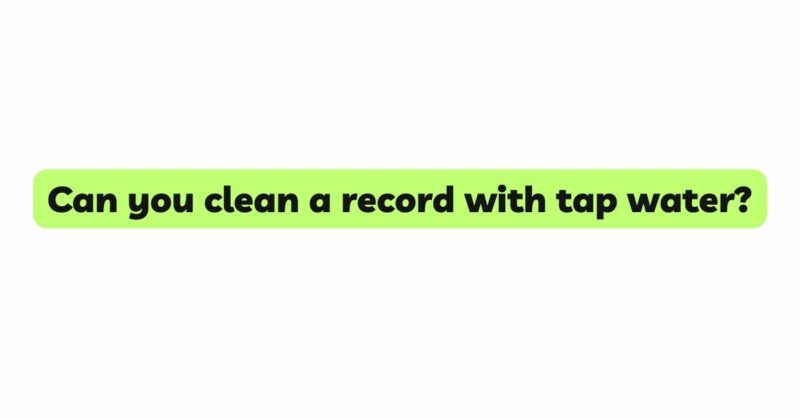Vinyl records have experienced a remarkable resurgence in recent years, captivating both nostalgic collectors and audiophiles seeking a warmer, richer sound. However, with this renewed interest in vinyl, there comes a responsibility to maintain and preserve these delicate musical treasures. Properly cleaning records is vital to ensure optimum sound quality and extend their lifespan. Among the various cleaning methods circulating within the vinyl community, a common yet controversial approach is cleaning records with tap water. In this article, we will delve into the myths and realities surrounding this practice to determine whether tap water is a viable option for record maintenance.
The Vulnerability of Vinyl Records:
Vinyl records consist of a thin polyvinyl chloride (PVC) layer, which holds the grooves containing the audio information. While the material is durable, it is susceptible to dust, dirt, oils, and contaminants that can settle into the grooves over time, degrading sound quality and causing surface noise. Cleaning records regularly is crucial to preserving their fidelity and avoiding unnecessary wear on the stylus.
The Tap Water Method:
Cleaning records with tap water involves a straightforward process: gently rinsing the record’s surface with water from the tap and then patting it dry with a soft lint-free cloth. Some proponents of this method argue that using tap water is an eco-friendly and cost-effective alternative to commercial cleaning solutions. However, before rushing to clean your vinyl collection with tap water, it is essential to understand the potential risks and drawbacks associated with this approach.
The Risk of Residue:
Tap water might appear clean to the naked eye, but it can contain various minerals, chlorine, and impurities that leave behind residue on the record’s surface after drying. This residue can introduce additional noise, diminish audio quality, and even lead to groove damage over time. Additionally, minerals in tap water might form sediment deposits within the record grooves, exacerbating wear and tear on both the record and the stylus.
Effects on Groove Integrity:
Vinyl records are incredibly sensitive, and any damage to their delicate grooves can significantly impact playback quality. Even if tap water is clean and filtered, the process of applying water and wiping it off introduces the risk of accidentally damaging the grooves. Small particles present in tap water, such as microscopic debris or minerals, can scratch or dislodge the PVC, leading to permanent sound degradation.
Mold and Mildew Concerns:
Another issue with using tap water to clean records is the risk of introducing moisture into the grooves. If not entirely dried, the water may linger, creating a conducive environment for mold and mildew growth. The growth of mold and mildew can further compromise the sound quality and render the record unplayable.
Tap Water pH and Record Chemistry:
The pH level of tap water can vary based on regional water sources, and using water with high or low pH levels can have adverse effects on vinyl records. A highly acidic or alkaline solution can react with the PVC material, causing discoloration, degradation, and brittleness over time. Therefore, unless the tap water’s pH is tested and balanced appropriately, its use as a cleaning agent remains questionable.
Alternatives to Tap Water:
For record collectors seeking an economical and environmentally friendly cleaning solution, several safe alternatives exist that mitigate the risks associated with tap water. One of the most popular options is using a mixture of distilled water and isopropyl alcohol. This combination effectively cleans records without leaving behind harmful residue or introducing excessive moisture.
Commercial record cleaning solutions are also available, specifically designed to clean vinyl records safely. These products are formulated to eliminate contaminants effectively without compromising the vinyl’s structural integrity or audio quality.
Proper Record Cleaning Technique:
Regardless of the cleaning solution chosen, the technique employed is equally critical in preserving vinyl records. Here are some essential tips for proper record cleaning:
- Use a soft, anti-static brush to remove surface dust and debris before applying any cleaning solution.
- Apply the cleaning solution sparingly and evenly, using a microfiber cloth or a dedicated record cleaning brush.
- Gently wipe the record in a circular motion, following the grooves, and avoid applying excessive pressure.
- Allow the record to air dry completely before placing it back into its sleeve.
- Always store records vertically to prevent warping and further protect them from dust and contaminants.
Conclusion:
While tap water may seem like a convenient and eco-friendly option for cleaning vinyl records, the potential risks and drawbacks associated with its use outweigh its benefits. The vulnerability of vinyl records necessitates a careful and informed approach to cleaning. Employing a suitable record cleaning solution, along with proper cleaning techniques, will ensure that your vinyl collection remains in pristine condition, allowing you to enjoy its exceptional sound quality for years to come.

